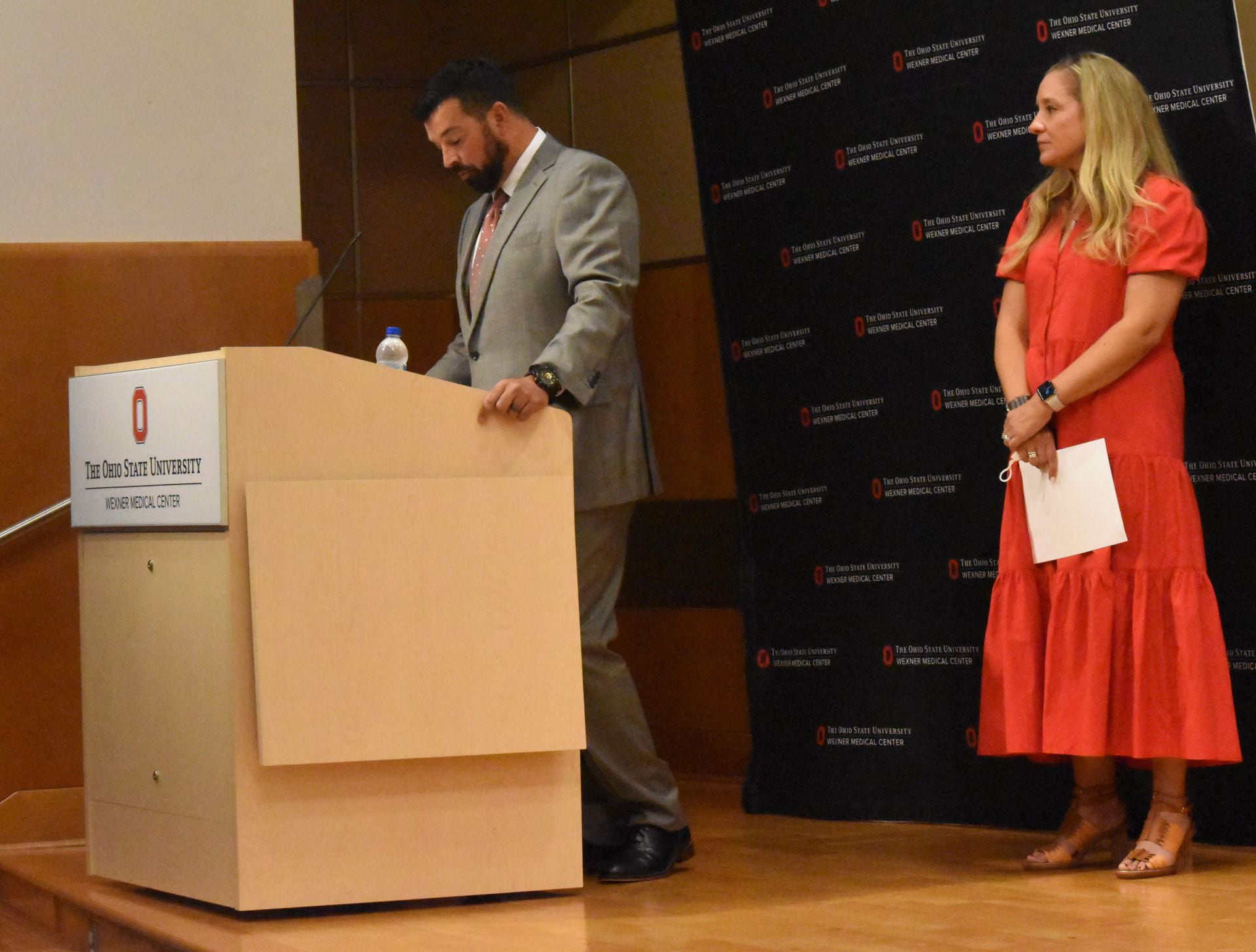Head coach Ryan Day and his wife, Nina, made a $1 million donation to The Ohio State University Wexner Medical Center and College of Medicine Wednesday to establish The Nina and Ryan Day Resilience Fund, promoting mental health resources and encouraging young adults to address their overall well-being. Credit: Jacob Benge | Sports Editor
Head coach Ryan Day and his wife, Nina, made a $1 million donation to The Ohio State University Wexner Medical Center and College of Medicine Wednesday to establish The Nina and Ryan Day Resilience Fund, promoting mental health resources and encouraging young adults to address their overall well-being.
Alongside University President Kristina M. Johnson and others at the Richard M. Ross Heart Hospital, Ryan Day said he wants young adults and adolescents around Ohio State and Columbus to become aware of mental health resources available and know they’re not alone. The fund will be housed in the Department of Psychiatry and Behavioral Health, according to a news release.
“The thing that’s different here is this is people we work with every day. This is college-aged students. These are adults,” Day said. “Certainly, that college age when Nina and I started talking about that, that’s a tough year for a lot of people. That’s a tough stretch for a lot of people, and so they need the resources. They need to help, but then also identifying what those risk factors are. We’d really love to be a part of [that] to get in front of it.”
Dr. K. Luan Phan, who is a professor and chair of the Department of Psychiatry and Behavioral Health, said the fund will serve as a “catalyst” for discussion about mental health and provide resources for those seeking help.
“Resilience, as coach Day said, is the ability to bounce back. Not only to bounce back, but to learn, to adapt, thrive and even do better than what we had before,” Phan said. “As coach Day knows really well, we can’t play defense all the time. We have to take the offense, and to me, the resilience game is really an offense game.”
Phan said he wants to create an avenue for individuals to support one another through the daily stressors in life.
“We need to fight mental illness just like we fight cancer, just like we fight heart disease, just like we fight any other physical illness,” Phan said. “For us in our department and Harding Hospital, mental illness, physical illness are one in the same, and I think we need to have that kind of conversation going forward.”
Mental health is a topic near to Ryan Day; his father died of suicide in 1988 when Ryan Day was just 8 years old.
Through discussion with his wife, family and others close to him, the Day family have taken initiative to help others who struggle with mental health.
“The roughest point in my life was in college — and there were no resources, and I privately struggled,” Nina Day said. “As I had children and growing up with Ryan, we just decided how important it was for them to grow up in a different world where if they experience any type of anxiety or depression that they have resources and that they felt empowered to ask for help.”
Both Ryan and Nina Day have spoken publicly about the importance of maintaining overall wellness, including the former holding a keynote speech on breaking the stigma of mental health in April.
The creation of The Nina and Ryan Day Resilience Fund shows their continued philanthropy as the Day family made a commitment to help be at the forefront of mental health discussion by creating The Ryan and Christina Day Fund for Pediatric and Adolescent Mental Wellness at Nationwide Children’s Hospital in 2019.
Even though many areas of life may appear to be back to “normal” for some after the COVID-19 pandemic, Ryan Day said others still may feel its impact mentally.
“For a lot of our teenagers, college students and young people, normal was COVID. That was a big part of their life,” Day said. “I think recognizing that, being aware of that, of how they go, because they’ve gone, really, from a lot of them, isolation to now getting back to working with people, and really talking about it is the biggest thing.”
In March, former offensive lineman Harry Miller retired from football due to challenges with his mental health.
Ryan and Nina Day both said investing in mental health resources is a “tremendous privilege,” especially at Ohio State and in the Columbus community.
Johnson believes the fund is a sign of leadership, and said offering help and support around the campus community is “powerful.”
“This isn’t just a job; it’s a mission. It’s a calling,” Johnson said. “I think we see it all throughout all the staff and our faculty that, when they can, they step up.”
Building resiliency is a focal point in the battle against mental health, Ryan Day said. When someone isn’t feeling well, he wants individuals to feel comfortable seeking a trusted person or teammate, just like on the football field.
“It’s hard to in the moment, but to recognize that if you do break your leg, there’s a solution — it’s to go in and get a cast and get it healed,” Ryan Day said. “When you have a mental affliction, it’s similar. It doesn’t seem similar, but it is. There’s a solution. There’s treatment. There’s different avenues that we can take to help treat those types of things, so I just think that that approach is hopeful and not where you think there’s no answers.”














